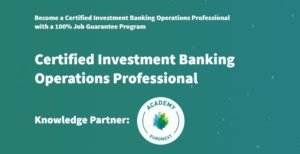Taking banking certification courses will improve your professional profile if you aspire to pursue investment banking. It will elevate your reputation in front of job recruiters as it will be proof of your credibility. Although it’s not compulsory, having banking certifications shows that you have been through vigorous training and have a better career prospect than most applicants.
Success is a by-product of the efforts and hard work that you put in. However, you are proving that you are determined to prosper and add value in this field by taking investment banking courses after graduation. Most job recruiters search for employees with more than just basic knowledge of investment banking. These courses will help you add an edge to your profile and provide you with better opportunities.
Steps for Preparation of Investment Banking Certification Exam
1. Obtaining a Bachelor’s Degree
In order to be qualified for a career in investment banking, you must complete your bachelor’s degree in finance, commerce, or accounts. Not only does graduation provide quality education, but it also allows students to find peers who are on the same journey. They make connections with industry experts and get many opportunities for their foundation experience. It will also be the beginning of your choice of career in investment banking.
2. Obtaining a Master of Business Administration Degree
One of the most crucial steps before entering an investment banking career is earning an MBA in finance. It covers most of the basics, including marketing, accounting, business finance, business management, business analysis, and much more. What makes an MBA all the more important is the number of networks one gets to make in this field.
Most people, after graduation, go straight toward job opportunities, which limits their career prospects. Since there is so much more to learn and many other experiences yet to test, you may not find an excellent, high-paying job. So, do not stop after your bachelor’s degree.
3. Gaining Experience By Doing Investment Banking Internship
Having practical knowledge adds more understanding to theoretical knowledge. Doing an internship helps potential investment bankers to learn more comprehensively. Most institutions offer internships to their students after the completion of their desired banking course. University students enrol for short-term internships such as three months or six months. They learn about various technical skills as they work on transactions and deals with clients.
The first position as an entry-level intern is an investment banking analyst. Unlike other professions where the candidates are expected to know it all, investment banking companies provide hands-on training in which the candidate will be taught everything about their first role. They will be taught tasks such as organising data, managing client relations, using financial models to tackle the situation, etc.
4. Choosing The Right Investment Banking Career
One of the most common mistakes made by people in this industry is needing to research more career prospects before enrolling themselves on more courses and certification tests. Just like other careers, investment banking holds many roles and positions. These distinctions are made solely to execute targeted functions for the company. Each role differs from the other based on the candidate’s skill sets. If the candidate wishes to work on the operational side of investment banking, they have to take a different test than working on the corporate investment side. Each sub-divisions demands specific knowledge which cannot be obtained by enrolling oneself in a generalised investment banking certification course.
5. Learning Important skills
In order to do well in your investment banking certification exams, you must be good at these skills. Having professional efficiency in using the following computer programs is crucial. It includes:
- MS Excel- to examine all financial data of the company, forecasting and creating financial models.
- MS Word- to maintain any set of financial documents uniformly so that it’s always ready to use.
- MS PowerPoint- to develop constructive strategies in terms of presentations for better assessment.
- Bloomberg Terminal- to be constantly in touch with real-time market trends and data.
- Power BI- to build well-structured and creative data visualisation designs.
Conclusion
Investment banking is a challenging profession that requires first-class education in finance. Students must ace mathematical, problem-solving, logical, investigative, and, most importantly, objective analysis. Investment bankers work with the board of directors, marketing managers, associates and analysts of specific organisations. They analyse and report market trends and prepare presentations and proposals for companies to take their financial decisions.
It is pretty tricky for students to find suitable investment banking courses in India. Here’s a suggested Certified Investment Banking Operations Program (CIBOP) for you. You can find all relevant skills offered here and promising career opportunities to kickstart your profession. Skills such as objective thinking, problem-solving, data analysis, etc., must be thoroughly known to an aspiring investment banker.
This job requires in-depth learning of the finance field, which is why recruiters very much appreciate extra learning courses.











 Learn and grow with Imarticus!
Learn and grow with Imarticus! Gain Industry Certifications:
Gain Industry Certifications: